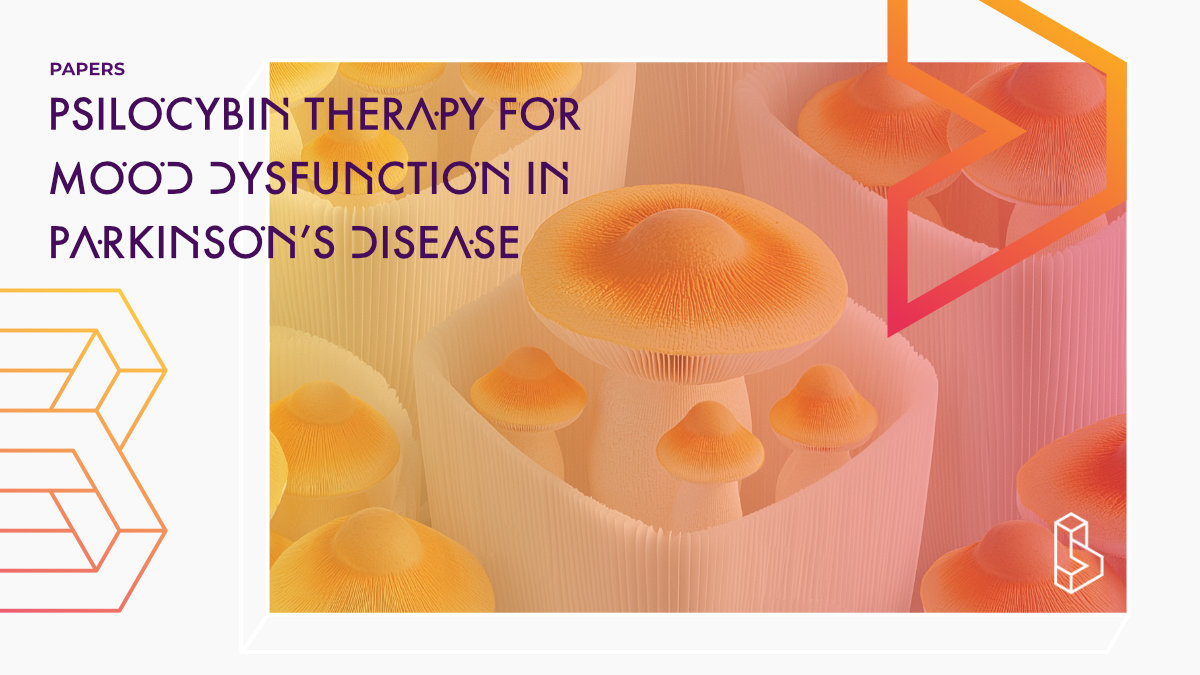This open-label pilot study (n=12) found that psilocybin therapy (10mg followed by 25mg dose with psychotherapy) for Parkinson’s disease patients with depression and/or anxiety appeared safe with no serious adverse events, whilst showing promising improvements in motor symptoms, cognitive function, depression and anxiety that persisted at three-month follow-up.
Abstract of Psilocybin therapy for mood dysfunction in Parkinson’s disease
“Mood dysfunction is highly prevalent in Parkinson’s disease (PD), a main predictor of functional decline, and difficult to treat—novel interventions are critically needed. Psilocybin shows early promise for treating depression and anxiety, but its potential in PD is unknown, as safety concerns have excluded people with neurodegenerative disease from previous trials. In this open-label pilot (NCT04932434), we examined the feasibility of psilocybin therapy among people with mild to moderate stage PD plus depression and/or anxiety. 12 participants (mean age 63.2 ± 8.2 years, 5 women) received psilocybin (one 10 mg followed by one 25 mg dose) with psychotherapy. There were no serious adverse events, no medical interventions required to manage effects of psilocybin, and no exacerbation of psychosis. Ten participants experienced treatment-emergent adverse events; the most frequent were anxiety, nausea, and increased blood pressure. We observed no worsening of PD symptomology measured by the Movement Disorder Society Unified Parkinson’s Disease Rating Scale (MDS-UPDRS). On the contrary, non-motor (MDS-UPDRS Part I: –13.8 ± 1.3, p < 0.001, Hedges’ g = 3.0) and motor symptoms (Part II: –7.5 ± 0.9, p < 0.001, g = 1.2; Part III: –4.6 ± 1.3, p = 0.001; g = 0.3) as well as performance in select cognitive domains (Paired Associates Learning [-0.44 ± 0.14, p = .003, g = 0.4], Spatial Working Memory [–0.52 ± 0.17, p = 0.003, g = 0.7], and Probabilistic Reversal Learning [2.9 ± 0.9, p = 0.003, g = 1.3]) improved post-treatment, and improvements were sustained until the final safety assessment one month following drug exposure. Baseline Montgomery-Asberg Depression Rating Scale (MADRS) and Hamilton Anxiety Rating Scale (HAM-A) scores were 21.0 ± 8.7 and 17.0 ± 3.7, respectively. Both improved to a clinically meaningful degree post-treatment; these improvements persisted to the final assessment three months following drug exposure (MADRS: -9.3 ± 2.7, p = .001, g = 1.0; HAM-A: –3.8 ± 1.7; p = 0.031, g = 0.7). This study provides the first data on psilocybin’s effects in any neurodegenerative disease. Results suggest that psilocybin therapy in PD warrants further investigation.“
Authors: Ellen R. Bradley, Kimberly Sakai, Gisele Fernandes-Osterhold, Balázs Szigeti, Connie Ludwig, Jill L. Ostrem, Caroline M. Tanner, Meredith A. Bock, Katiah Llerena, Patrick R. Finley, Aoife O’Donovan, Jose Rafael P. Zuzuarregui, Zachary Busby, Amber McKernan, Andrew D. Penn, Aliss C. C. Wang, Raymond C. Rosen & Joshua D. Woolley
Summary of Psilocybin therapy for mood dysfunction in Parkinson’s disease
Parkinson’s disease (PD) is a progressive neurodegenerative disorder that is becoming increasingly prevalent worldwide. While traditionally known for its motor symptoms, PD also causes a range of non-motor symptoms due to the widespread aggregation of α-synuclein protein in the brain. Depression and anxiety are among the most common non-motor symptoms and are strongly associated with poor quality of life and accelerated functional decline. Unfortunately, current treatments for mood disorders have limited efficacy in PD patients, and there have been remarkably few clinical trials investigating novel interventions.
Bradley and colleagues note that while psilocybin has shown promising antidepressant and anti-anxiety effects in major depressive disorder and terminal cancer patients, no studies have examined its effects in PD or any neurodegenerative disease. After ingestion, psilocybin is converted to psilocin, which acts on multiple serotonin receptors including 5-HT2A. While the acute effects typically resolve within six hours, a single administration combined with psychotherapy support can produce lasting mood improvements. The mechanisms aren’t fully understood, but one leading hypothesis suggests psilocybin acts as a “psychoplastogen” – stimulating neuronal growth that leads to enduring changes in dendritic architecture and synaptic restructuring.
However, the safety of psilocybin for PD patients requires careful evaluation due to several concerns. First, the drug’s cardiovascular effects could pose elevated risks given the older age and autonomic dysfunction associated with PD. Second, psilocybin’s effects on serotonin signaling could potentially impact other PD symptoms, as altered serotonin function is implicated in both motor impairment and PD psychosis. Psychosis is common in PD, affecting over 40% of patients, and there are concerns that psilocybin could trigger or worsen psychotic symptoms. Additionally, the drug’s interactions with other serotonin receptors linked to tremor and dyskinesia make it difficult to predict potential effects on motor function. Finally, possible drug interactions between psilocybin and levodopa, the main PD treatment, are unknown.
Methods
Study Design and Participants
Find this paper
Psilocybin therapy for mood dysfunction in Parkinson's disease: an open-label pilot trial
https://doi.org/10.1038/s41386-025-02097-0
Open Access | Google Scholar | Backup | 🕊
Cite this paper (APA)
Bradley, E. R., Sakai, K., Fernandes-Osterhold, G., Szigeti, B., Ludwig, C., Ostrem, J. L., ... & Woolley, J. D. (2025). Psilocybin therapy for mood dysfunction in Parkinson’s disease: an open-label pilot trial. Neuropsychopharmacology, 1-10.
Study details
Compounds studied
Psilocybin
Topics studied
Depression
Anxiety
Safety
Study characteristics
Original
Open-Label
Participants
12
Humans
Compound Details
The psychedelics given at which dose and how many times
Psilocybin 10 - 25mg | 2x
Linked Clinical Trial
Psilocybin Therapy for Depression and Anxiety in Parkinson's Disease (PDP)The purpose of this study is to determine the safety, tolerability, and feasibility of psilocybin therapy for depression and anxiety in people with Parkinson's disease.

